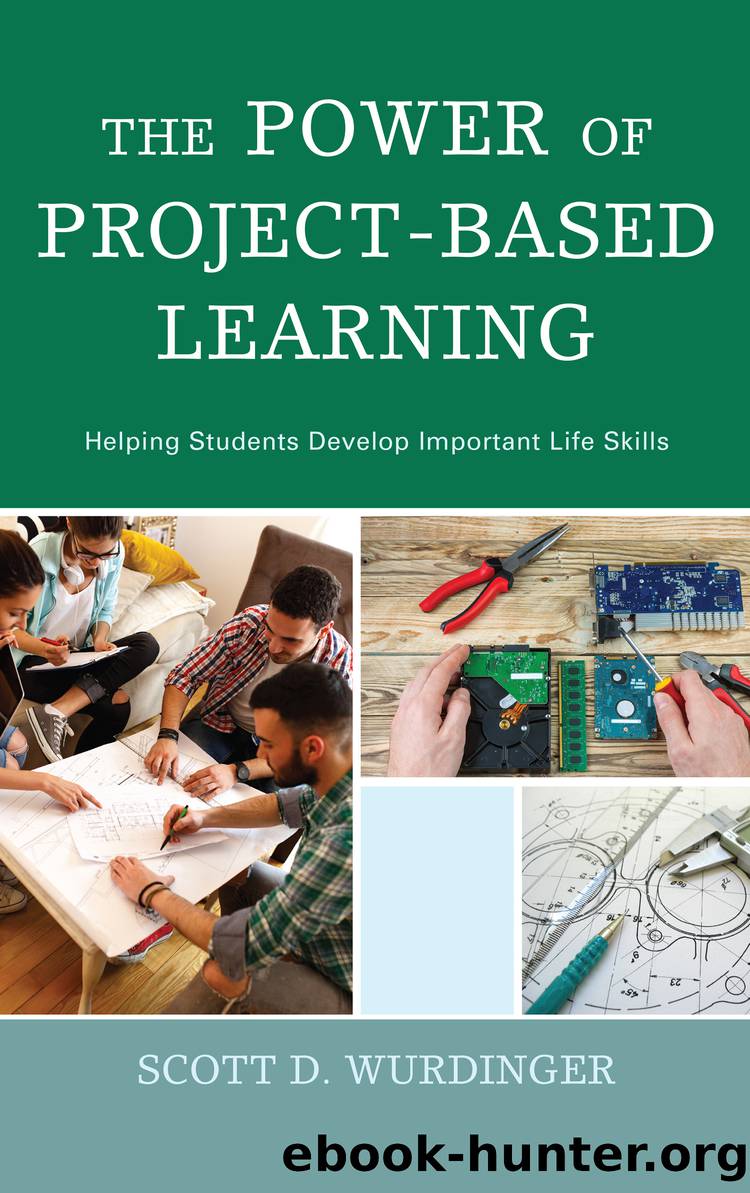The Power of Project-Based Learning by Scott D. Wurdinger

Author:Scott D. Wurdinger [Wurdinger, Scott D.]
Language: eng
Format: epub
Publisher: Rowman & Littlefield Publishers
Published: 2016-08-15T00:00:00+00:00
Projects Outside the Local Community
The students in this program are mostly from out of state and are transient, in that they are usually at this university for two or three years before moving on. In one course, Experiential Learning and Education Reform, my students are encouraged to think of a placeâmeaning a geographic locationâand organization where they might see themselves working in the future. Then they communicate with members of this organization to inquire about potential projects that the students could develop for them. Ultimately, they use these place-based projects as a vehicle to exploring potential job opportunities.
Students in this course have reached out far and wide in an attempt to help organizations with projects and to explore the possibility of employment. Since most of the students are educators, they often create curricula for these organizations.
Outdoor Education School
One student created an outdoor education curriculum that included rock climbing, canoeing, and backpacking. She researched schools in Minnesota that might be interested in integrating outdoor education into their curricula. She found a charter school called Northwest Passages in Minneapolis, drove up to the school, and proposed her curriculum to the schoolâs director.
The timing was perfect, and the director had a background in outdoor education, so he was familiar with the content of her proposal. She was hired there directly after she graduated from our program and worked there for several years leading outdoor education trips. She left this job for another similar position located further north in Minnesota.
Science School
Another student was very excited about moving out West to live in the mountains of Wyoming. He had an undergraduate degree in biology and found a school outside of Jackson Hole called the Teton Science School, where he was interested in working. He proposed some science curriculum ideas that included hiking into the backcountry to study plants, animals, and mountain ecosystems. He too was hired directly after graduating, as an instructor for this school.
Montessori School
One student was on a mission to become a teacher at a Montessori school, so she focused all of her energy while in Mankato on researching these schools and learning about their teaching certificate program. Maria Montessori, the programâs founder, believed strongly in using an active approach in the classroom, which is aligned with the philosophy of experiential learning and is the reason why this student was so attracted to these schools.
In describing Maria Montessoriâs philosophy, Reed (2008, 4) says she created âan atmosphere for her students in which they were free to explore and discover for themselves.â My student wanted to teach elementary-age students in an environment where they were free to discover and explore on their own.
She was from California, so while she was in the process of completing her masterâs degree in experiential education, she decided to use the Montessori teaching certificate as her final project for our masterâs program. While finishing her project, she was in communication with a Montessori school in California and explained that her final project for our masterâs degree was the Montessori teaching certificate.
Download
This site does not store any files on its server. We only index and link to content provided by other sites. Please contact the content providers to delete copyright contents if any and email us, we'll remove relevant links or contents immediately.
Macmillan Primary Grammar 2 Pupil's Book by Unknown(424)
Figuring Out Fluency in Mathematics Teaching and Learning, Grades K-8 by Jennifer M. Bay-Williams & John J. SanGiovanni(375)
The Principal's Guide to Curriculum Leadership by Sorenson Richard D.;Goldsmith Lloyd M.;Mendez Zulma Y.;Maxwell Karen T.;(298)
Learning from Accidents 3rd ed by Trevor Kletz (2001)(274)
Harnessing Technology for Deeper Learning by Scott McLeod(261)
English Grammar Practice--The Noun by Roxana Nastase(257)
Text-Dependent Questions, Grades K-5 by Douglas Fisher & Nancy Frey & Heather Anderson & Marisol Thayre(237)
A Guide to Curriculum Mapping by Hale Janet A.;(237)
English Language Program Administration by Unknown(232)
How to Do Everything with Google Tools by Unknown(228)
The Grammar Teacher's Activity-a-Day by Jack Umstatter(212)
Deep Change Leadership by Reeves Douglas;(212)
The Power of SMART Goals by Conzemius Anne;O'Neill Jan; & Anne Conzemius(196)
Using Data to Close the Achievement Gap by Johnson Ruth S.;(187)
Beyond the RTI Pyramid by Bender William N.;(182)
Aligning and Balancing the Standards-Based Curriculum by Squires David A.;(181)
Functional Neuroradiology: Principles and Clinical Applications by Scott H. Faro (editor) Feroze B. Mohamed (editor)(180)
Using Equity Audits to Create Equitable and Excellent Schools by Skrla Linda E.;McKenzie Kathryn B.;Scheurich James Joseph;(172)
Differentiated Instructional Strategies for the Block Schedule by Gregory Gayle H.;Herndon Lynne E.; & Lynne E. Herndon(170)
